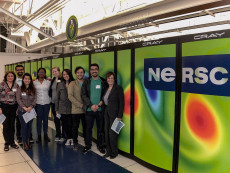Computational Research Division Hosts UC Merced Grad Students
April 25, 2018

UC Merced graduate students pose in front of the Cori supercomputer at NERSC during a recent tour. The interdisciplinary group, ranging from archaelogists to computer scientists, was hosted by CRD Director David Brown. Image: Margie Wiley
On April 19, a group of PhD students from UC Merced, all participants in the National Science Foundation’s Interdisciplinary Computational Graduate Education (ICGE) program, visited Berkeley Lab to learn about the many ways computing can be applied to research problems.
Computational Research Division (CRD) Director David Brown, who hosted the group, delivered opening and closing remarks. There were also talks from NERSC's Prabhat and CRD's Sean Peisert, Julian Borrill, Deb Agarwal, Mike MacNeil, Andy Nonaka and Silvia Crivelli. The group also took a tour of the NERSC computer room.
Brown and Deputy Lab Director Horst Simon serve on the advisory board for the ICGE program, which is now in its second year. The program is designed to enhance student success and reduce graduate student attrition rates in the computational sciences, particularly for underrepresented minorities and first-generation students, while fostering computational and data analytic skills within an interdisciplinary framework.
“Fifty percent of PhD students nationwide drop out, and that number is even higher among minority students,” said Prof. Marjorie S. Zatz, principal investigator for the UC Merced ICGE program and vice provost and graduate dean at the university. “By providing these opportunities and multiple mentorships, we provide a very safe environment for these students to learn and explore and manage interactions. It is a mix of learning coding, working on projects, successfully navigating through graduate school and moving into the business world.”
About Berkeley Lab
Founded in 1931 on the belief that the biggest scientific challenges are best addressed by teams, Lawrence Berkeley National Laboratory and its scientists have been recognized with 16 Nobel Prizes. Today, Berkeley Lab researchers develop sustainable energy and environmental solutions, create useful new materials, advance the frontiers of computing, and probe the mysteries of life, matter, and the universe. Scientists from around the world rely on the Lab’s facilities for their own discovery science. Berkeley Lab is a multiprogram national laboratory, managed by the University of California for the U.S. Department of Energy’s Office of Science.
DOE’s Office of Science is the single largest supporter of basic research in the physical sciences in the United States, and is working to address some of the most pressing challenges of our time. For more information, please visit energy.gov/science.









